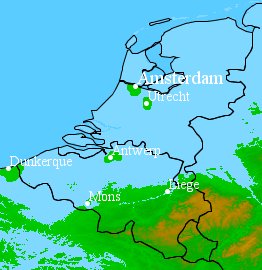The Kingdom of the Netherlands
The Netherlands, previously the Dutch Republic, had gained independance from the Spanish Empire and spent much of its infancy fighting against its former master. With defeat and then success fortunes changed and the Dutch trading fleets were able to master trade from faraway countries and provide the resources to challenge Spain.
England, too, helped, and before long was fighting against the Spanish, helping the Dutch Republic take the Spanish Netherlands and humiliate the Spanish themselves. At the Treaty of London 1606 peace was made with Spain and the Dutch Republic was recognised as the Kingdom of the Netherlands with the English King, Henry IX, as its symbolic head of state.
The Netherlands continued being a significant player but suffered far more than any other European country in the Flood. By the times the waters stopped rising, barely a fraction of the Netherlands remained and the desperate attempts to preserve key cities such as Amsterdam have left behind ghost-towns, unsupported by land or people.
The Dutch themselves have mostly fled - to Albion, France, Germany, only few were able to remain and keep their land, but no longer as a distinct and seperate country. The Kingdom of the Netherlands came more and more under the sway and governence of the Queens and Kings of Albion.
Relations with Albion
The remains of the Kingdom of the Netherlands is run by the King of Albion through a Governor-General who is usually from the family of Orange-Nassau, the most powerful noble family of the Netherlands. Tension is possible, but Albion has let the Dutch keep themselves to themselves and unrest or displeasure with Albion's rule is extremely rare.
Prince Frederick-William of Orange
The current Governor-General is Prince Frederick-William, a capable governor and a friend of the King. He is known to have eccentricities, but they are largely ignored as they do little to hamper his ability to govern.
Dutch Trade
The Dutch East India Company, a major trading company has grown apart from the Netherlands itself since the Flood and the breaking of the Netherlands. Many of its members removed their headquarters to Indonesia (a major trading post of theirs) and have since become a Mercenary Traders. The East Dutch Company conducts trade from Indonesia, India, East Africa and surrounding lands to Europe and hires out its services to those who wish to start trade or obtain a certain valuable product.

